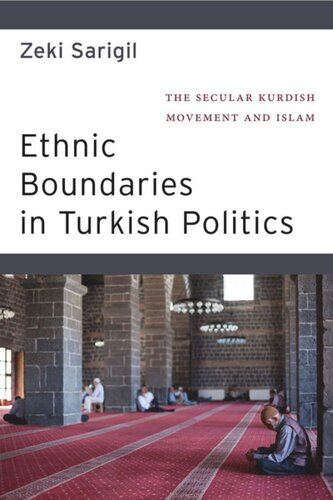

Most ebook files are in PDF format, so you can easily read them using various software such as Foxit Reader or directly on the Google Chrome browser.
Some ebook files are released by publishers in other formats such as .awz, .mobi, .epub, .fb2, etc. You may need to install specific software to read these formats on mobile/PC, such as Calibre.
Please read the tutorial at this link: https://ebookbell.com/faq
We offer FREE conversion to the popular formats you request; however, this may take some time. Therefore, right after payment, please email us, and we will try to provide the service as quickly as possible.
For some exceptional file formats or broken links (if any), please refrain from opening any disputes. Instead, email us first, and we will try to assist within a maximum of 6 hours.
EbookBell Team

0.0
0 reviewsThe Kurdish Movement in Turkey’s growing alliance with Islam
One of the fault lines of Turkish politics traditionally has been the divide between religious and secular movements. However, as Zeki Sarigil argues, the secular Kurdish movement in Turkey has increasingly become aligned with Islam. As a result, Islam has become part of the movement’s political discourse, strategies and actions.
Ethnic Boundaries in Turkish Politics traces the evolving relations between the leftist, secular Kurdish movement and Islam, from an apathetic and/or antagonistic attitude in the 1970s and 1980s to an increasingly Islam-friendly approach in the 1990s to an attitude of accommodation and the rise of Kurdish-Islamic synthesis in the early 2000s. Based on 104 interviews in several provinces in Turkey (primarily Ankara, Diyarbakir, Istanbul, and Tunceli) between 2011 and 2015 as well as ethnographic data, public opinion surveys and statements from the Kurdistan Workers’ Party (PKK) and Kurdish leaders, Sarigil shows how the secular Kurdish movement increasingly has been endorsing Islam and Islamic actors. The reasons for this Islamic opening are global, national, and local; Sarigil demonstrates that a group of strategic and ideological factors have encouraged and/or forced Kurdish leaders to redraw symbolic and social boundaries of the movement. Namely, with the end of the Cold War support for Marxist ideas collapsed, creating increasingly more favorable responses towards religion. In addition, the movement’s need to expand its social basis and popularity; electoral politics; and legitimacy struggles against rival political actors were other major factors, which triggered the Kurdish movement’s boundary expansion (i.e. its Islamic opening). The study also shows that the Kurdish boundary making was not without any tension or contestation. The boundary expansion by Kurdish ethnopolitical elites triggered both internal and external boundary contestations.
The movement’s embrace of Islam on a more widespread level has major ramifications for politics in Turkey and in the region. Ethnic Boundaries in Turkish Politics has important insight into the PKK, modern Turkish and Islamic societies and highlights the increasing role of Islam in global politics.